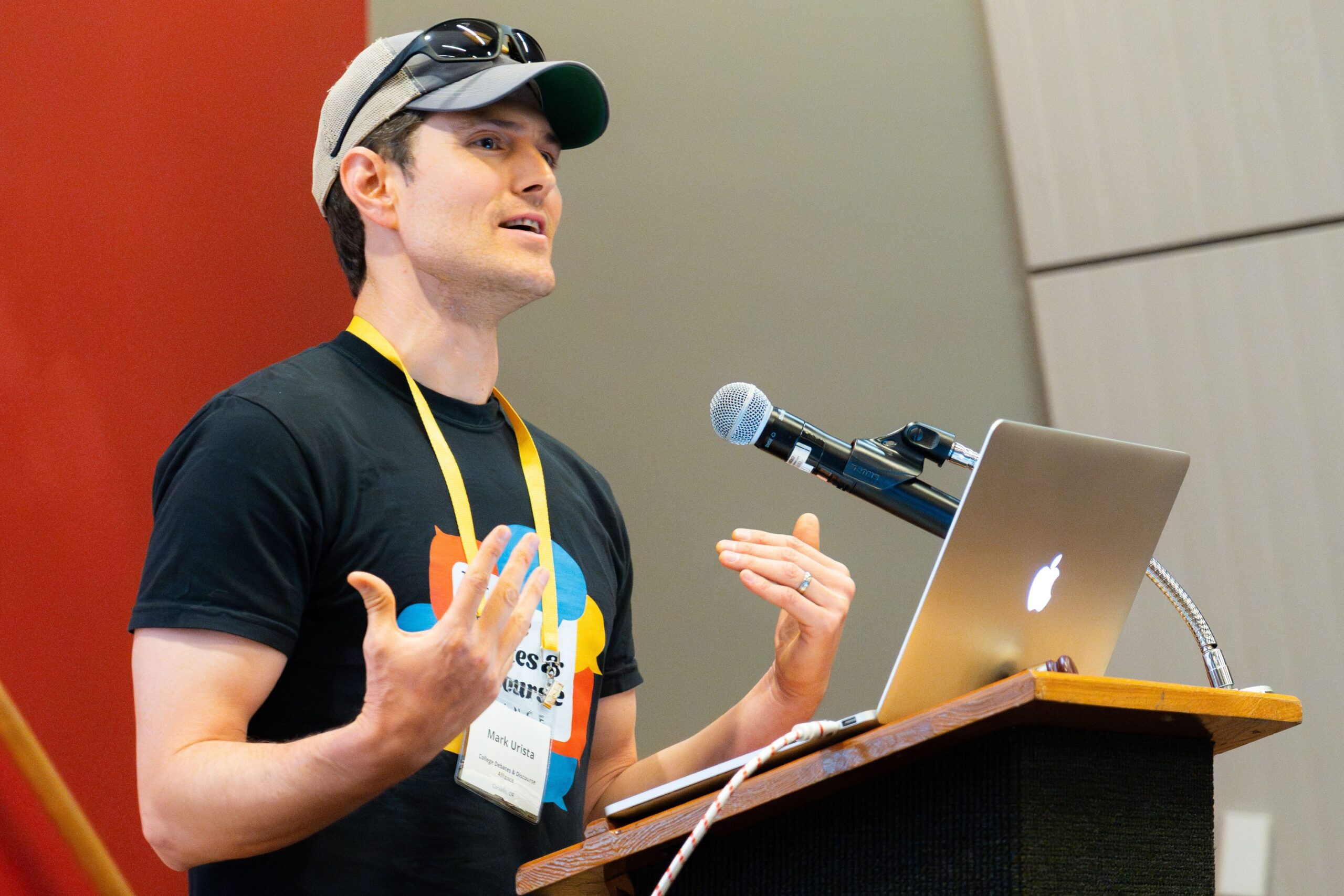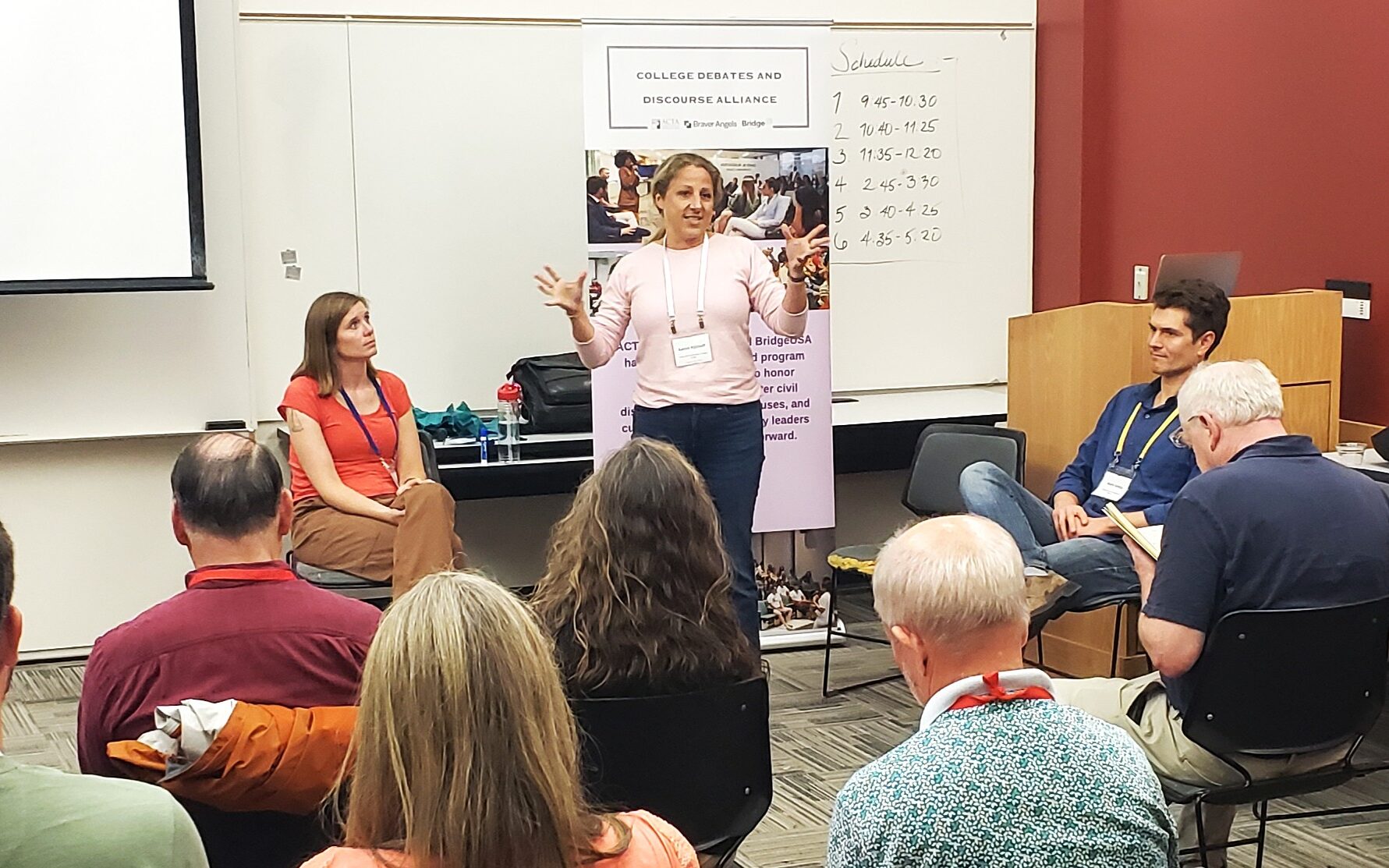In the inaugural edition of this newsletter, readers were introduced to Dr. David Wright, senior research scholar in the Department of Computer Science at North Carolina State University, who has conducted scores of Braver Angels classroom debates using the College Debates and Discourse (CD&D) Alliance Curricular Toolkit.
Generously funded by the Arthur Vining Davis Foundations and designed by faculty for faculty, the Curricular Toolkit is available for anyone who wants to implement a transformative classroom debate or dialogue for students. The current version contains a step-by-step guide for getting started, information about program offerings, and sample rubrics and other resources for creating an immersive, intellectually rich learning experience.
In this issue of our newsletter, I will share background on the Toolkit’s development, along with faculty perspectives on its value and utility in the classroom.

The origin of our Curricular Toolkit dates back to 2020. Amid the COVID-19 pandemic, colleges and universities nationwide moved their courses online. While converting his traditional courses to virtual platforms, Mark Urista, a Speech Communication instructor at Linn-Benton Community College, sought ways to keep his students intellectually engaged. From his work in the civil discourse space, Mark remembered learning about a special type of debate format in which participants share their authentic, personal views on controversial topics and seek to understand different perspectives. This format, he thought, could be a great way to hold debates in class and engage students in productive discussions from a distance. He contacted Braver Angels, the nonprofit organization behind the debate format, and was eventually introduced to ACTA’s Doug Sprei, program director and co-founder of the CD&D Alliance—at the time, a new partnership between ACTA and Braver Angels.
Upon learning that the Braver Angels debate format hadn’t yet been used in a college classroom, Mark wondered, ‘Could it be done…? ‘Why not give it a try?’ He did, and the results were highly encouraging. By the end of 2021, he had organized 11 Braver Angels collegiate debates at Linn-Benton Community College, which Doug and other CD&D members chaired online. Students who were accustomed to meeting in-person engaged very effectively via Zoom while debating a host of challenging political and social issues, including COVID-19 vaccine mandates and the merits of online instruction.
Mark’s involvement aligned fortuitously with our grant from the Arthur Vining Davis Foundations, which supported the development of a toolkit that would help faculty create and implement rigorous class assignments using the Braver Angels debate format. When he was asked to join the project, Mark enthusiastically accepted, and soon afterward brought in another faculty collaborator, Dr. Whitney Gent of the University of Nebraska–Omaha. Together with our team, they developed the first version of the CD&D Curricular Toolkit—with Mark’s own Toulmin model debate assignment serving as inspiration for the sample rubrics and brief templates.
“It was important to create a toolkit because the Braver Angels debate format, while powerful, sometimes prompted participants to question the accuracy of a statement or claim and presented a need for evidence supporting different points of view,” Mark comments. “The toolkit requires students to do research and not just provide anecdotes. A good argument is ultimately evidence-based, supported by credible sources.”
“The toolkit requires students to do research and not just provide anecdotes. A good argument is ultimately evidence-based, supported by credible sources.
“What I’ve liked most about the toolkit in the classroom is the preparation that it helps students have before a debate. The toolkit forces them to do more research on points of argument and even refine their points.”
Mark and Whitney’s efforts paved the way for several other faculty to learn about the Alliance by way of the CD&D Curricular Toolkit. In May, I had the opportunity to sit down with three such professors—Dr. Jennie Keohane, Dr. Sanne Rijkhoff, and Dr. Melanie Escue—faculty partners who, like Mark, have used the toolkit to bring transformative debates and dialogue into their classrooms.
Dr. Jennie Keohane, associate professor at the University of Baltimore, was already thinking about how to make debates work well in her classroom when she saw a post from Whitney, an old graduate school friend, announcing the release of the CD&D Curricular Toolkit. She downloaded it immediately and got in touch with the team to learn more.
“Using the toolkit was really about building confidence in myself as an instructor to break out of the way I’ve been teaching debate so far,” Jennie says. “The sample debate brief and rubrics helped me 1) see what a class assignment could look like, and 2) redesign my templates to match the spirit of the Braver Angels debate style and support my students as they started their journey into research and persuasive argument.”
Over time, Jennie adapted the toolkit resources to suit her course objectives and student learning outcomes.
“Using the toolkit hasn’t made my job harder,” she remarks. “It has enhanced what I’m already doing, helping my students feel more comfortable and confident in their research, public speaking, and critical thinking. I’ve been able to adapt the toolkit easily to my own rubrics and online course shells.”

Dr. Sanne Rijkhoff, associate professor at Texas A&M University-Corpus Christi, also already had ideas for classroom discussions in Fall 2021 but lacked a structure to implement them. With support from the CD&D Alliance and Braver Angels Central Texas Alliance, Sanne combined the structure provided by the debate format with her own pedagogical vision.
“The biggest obstacle that students face in the classroom is their hesitancy to speak up,” she says. “The toolkit makes it so that students are better able to express themselves. It serves as a handrail, a guide for them throughout the process. While they might still be anxious before the debate, they know that they will be okay as they follow the steps outlined in the toolkit materials. Being developed by faculty and an actual organization in the higher education space, it has legitimacy and credibility, and it’s professional. The pedagogical advantages of using the toolkit are numerous.”
Being developed by faculty and an actual organization in the higher education space, it has legitimacy and credibility, and it’s professional. The pedagogical advantages of using the toolkit are numerous.
Many students who took part in the classroom debates came back to thank her: “It has prepared them for job interviews, other presentations, and even talking with friends. In hindsight, they see how beneficial it is to them. Ultimately, it is about talking and sharing perspectives, not about having the best, most researched speech. The experience helped every one of them to be heard.”
Dr. Melanie Escue, assistant professor at the University of North Carolina at Pembroke, has used the Curricular Toolkit while serving as a CD&D faculty fellow. “The toolkit provides a low-stress kickoff to the Braver Angels debate experience. . . It is a great foundation to get started, and offers plenty of room for intellectual freedom and pedagogical adaptation and experimentation. Complete instructional autonomy is honored.
“I really view the toolkit as a great structure and rubric to remove labor for teachers. I relied on it heavily my first semester as a faculty fellow. It demonstrates how faculty can hold debates successfully in the classroom. I now enjoy reenvisioning ways to use it, from graded components to written post-debate responses. It’s fun, but also serious for learning.”
Like so many of the faculty members we have worked with, Melanie cares deeply about her students. She shares this profound observation about the toolkit: “The one thing I would tell faculty is if they have ever wondered why their teaching techniques are not working, think about using the Curricular Toolkit because it centers student voices. Something like this can really invigorate and inspire students, and even faculty themselves. They’ll see the hope and the magic of the technique, which gives a roadmap to magnify student voices.”
The CD&D Curricular Toolkit, designed by faculty for faculty nationwide, is available on our website. Our team members can also provide support for faculty who would like help hosting their first classroom debate or workshop.
Later this summer, we will release a third, fully revised edition of the toolkit, which will include:
- A revised step-by-step guide for getting started with constructing a class assignment and determining which of our program offerings—a Braver Angels collegiate debate or A Braver Campus Dialogue (ABCD) workshop—would be best for your classroom;
- New fact sheets describing our core offerings; and
- Original assignment templates, rubrics, and other resources for creating and implementing an intellectually rigorous classroom debate or dialogue workshop.
Bryan Paul is Curricular Fellow for the College Debates and Discourse Alliance. If you would like to receive a copy of the CD&D Curricular Toolkit, contact him directly at wbpaul@GoACTA.org.
WHO WE ARE
Launched in 1995, we are the only organization that works with alumni, donors, trustees, and education leaders across the United States to support liberal arts education, uphold high academic standards, safeguard the free exchange of ideas on campus, and ensure that the next generation receives an intellectually rich, high-quality college education at an affordable price.
Discover MoreSTAY INFORMED
Sign up to receive updates on the most pressing issues facing our college campuses.